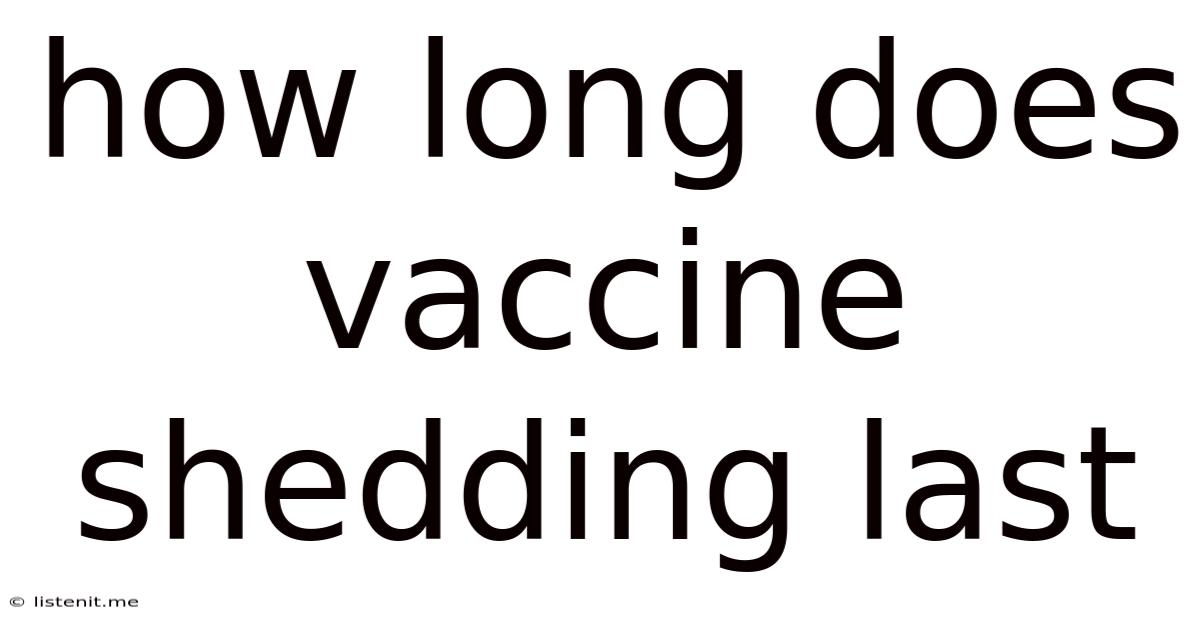How Long Does Vaccine Shedding Last
listenit
Jun 09, 2025 · 4 min read

Table of Contents
How Long Does Vaccine Shedding Last? Separating Fact from Fiction
The question of "vaccine shedding" – the hypothetical transmission of vaccine components from a vaccinated individual to an unvaccinated person – has become a topic of significant debate and misinformation. Understanding the science behind vaccine function and transmission is crucial to dispelling myths and anxieties surrounding this concept. This article will delve into the current scientific understanding of vaccine shedding, examining the evidence (or lack thereof) for its occurrence and duration, and addressing common concerns.
Understanding Vaccines and Their Mechanisms
Before addressing the question of shedding, let's clarify how vaccines work. Vaccines primarily introduce weakened or inactive parts of a pathogen (virus or bacteria) into the body. This triggers an immune response, prompting the body to produce antibodies and memory cells that provide future protection against the actual disease. Different vaccine types employ different methods:
- Live-attenuated vaccines: These use a weakened form of the virus. Examples include the measles, mumps, and rubella (MMR) vaccine and the chickenpox vaccine. These vaccines create a strong immune response that closely mimics a natural infection, but the weakened virus is not able to cause significant illness.
- Inactivated vaccines: These use killed versions of the virus or bacteria. Examples include the flu shot and polio vaccine. These vaccines are generally safer than live-attenuated vaccines, but they may require multiple doses for full immunity.
- Subunit, recombinant, polysaccharide, and conjugate vaccines: These vaccines use only specific parts of the pathogen, such as proteins or sugars. Examples include the Hepatitis B vaccine and some forms of the influenza vaccine. They are generally very safe and produce fewer side effects.
- mRNA vaccines: These vaccines use messenger RNA (mRNA) to instruct the body's cells to produce a harmless piece of the virus, triggering an immune response. Examples include some COVID-19 vaccines. They are also generally very safe and effective.
The Myth of Vaccine Shedding: What the Evidence Shows
The concept of "vaccine shedding" implies that components of a vaccine, such as the live virus in a live-attenuated vaccine, can be transmitted from a vaccinated individual to an unvaccinated person, causing illness in the latter. However, overwhelming scientific consensus indicates that this is largely a misconception.
Live-attenuated vaccines: While it's theoretically possible for a live-attenuated vaccine virus to be shed, the amount shed is usually extremely low and the virus is weakened to the point where it's unlikely to cause disease in a healthy individual. Furthermore, shedding typically occurs for a very short period, usually days to weeks after vaccination, and primarily through direct contact with respiratory or fecal secretions. The risk of transmission to a healthy individual is minimal, especially compared to the risk of contracting the disease naturally.
Other vaccine types: Inactivated vaccines, mRNA vaccines, subunit vaccines, and other vaccine types do not contain live viruses or bacteria. Therefore, these vaccine types cannot be shed in a way that could cause infection. The components of these vaccines are broken down and processed by the body and don't pose a risk to unvaccinated individuals.
Addressing Common Concerns and Misconceptions
Many concerns regarding vaccine shedding stem from a misunderstanding of basic virology and immunology. Let's address some common misconceptions:
Misconception 1: "My unvaccinated child got sick after being near someone who received a vaccine." Correlation does not equal causation. Just because a child got sick after being near a vaccinated individual doesn't automatically mean it's due to vaccine shedding. Many other factors could be responsible, including exposure to other infected individuals, coincidental illness, or a completely unrelated condition.
Misconception 2: "Vaccine shedding can cause long-term health problems." There is no credible scientific evidence to support this claim. The components of vaccines, even live-attenuated ones, are designed to be safe and are quickly processed by the body.
Misconception 3: "Vaccine shedding is a widespread and serious problem." This is demonstrably false. Major health organizations globally, including the Centers for Disease Control and Prevention (CDC) and the World Health Organization (WHO), have extensively reviewed the available data and found no evidence of significant vaccine shedding posing a threat to public health. The potential risk is extremely low.
The Importance of Vaccination and Herd Immunity
The benefits of vaccination far outweigh the negligible risks associated with the extremely low probability of shedding. Vaccines are one of the most effective public health interventions in history, having eradicated or greatly reduced the incidence of numerous deadly diseases. Vaccination not only protects individuals but also contributes to herd immunity, protecting those who cannot be vaccinated due to medical reasons.
Conclusion: Separating Fact from Fiction
The idea of widespread, significant vaccine shedding causing illness in unvaccinated individuals is not supported by scientific evidence. While extremely limited shedding may occur with live-attenuated vaccines, the risk is incredibly low and the duration is short. The focus should remain on the critical importance of vaccination for individual and public health, rather than perpetuating unfounded anxieties about vaccine shedding. Relying on credible sources of information from reputable health organizations is crucial in making informed decisions about vaccination. Disregarding science-based information in favor of misinformation can have serious public health consequences. Always consult with your healthcare provider for personalized guidance on vaccination.
Latest Posts
Latest Posts
-
Is Apomorphine For Dogs A Controlled Substance
Jun 09, 2025
-
Explosive That Starts With A T
Jun 09, 2025
-
How High Can A Tornado Lift A Car
Jun 09, 2025
-
Is Peristalsis A Characteristic Of Smooth Muscle
Jun 09, 2025
-
Intimal Sarcoma Of The Pulmonary Artery
Jun 09, 2025
Related Post
Thank you for visiting our website which covers about How Long Does Vaccine Shedding Last . We hope the information provided has been useful to you. Feel free to contact us if you have any questions or need further assistance. See you next time and don't miss to bookmark.